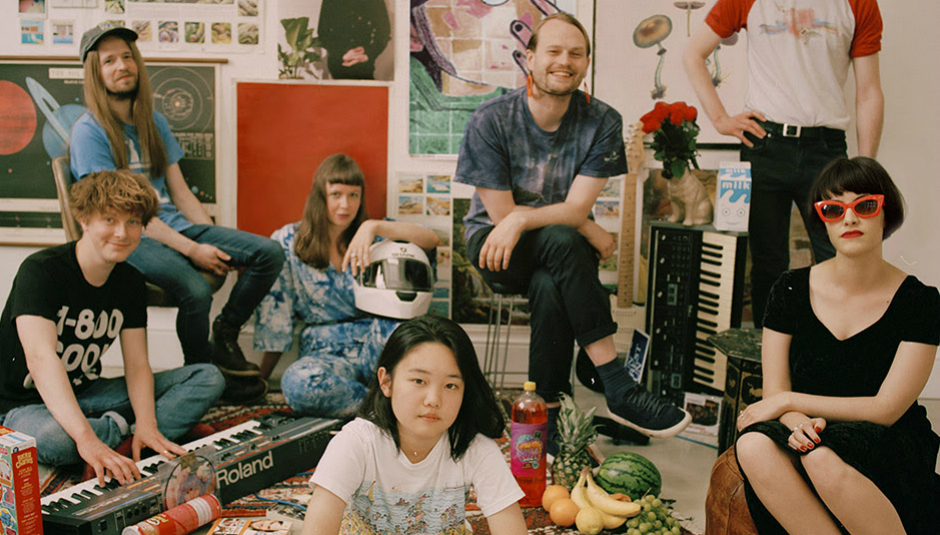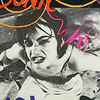By all accounts, Superorganism shouldn’t make sense as a band. And yet they perfectly encapsulate the modern 21st-century generation rooted in cyber-space. Superorganism started as a project with their members located in across the UK, the US, and Australia. They met through the airwaves, exchanged WhatsApp numbers, and recorded their debut single through e-mail correspondence. Superorganism’s music sounds like entire house parties contained within a three-minute track, eclectic soundbites and quirky melodies tied together by solid pop hooks. The eight-piece make joyously fun, effervescent electro-pop that bubbles over with a charming energy.
Initially formed when multi-instrumentalists Emily and Harry met on music forums years ago, the band continued to multiply and grow after they sent Orono Noguchi, then a 17-year-old living in Maine, USA, a demo of their track. Noguchi sent the sample back with her vocals recorded over it, and when ‘Something for Your ‘M.I.N.D.’ was released in early 2017, the Internet collectively fawned over the creative art project they had produced.
We have reached, or are reaching, the Internet era of independent music. Or have we been living in it for longer than we have realised? Courtney Barnett and Kurt Vile released their fantastic collaborative album Lotta Sea Lice last October after sending each other voice memos and email notes from Philly to Melbourne. You search on Gumtree for ads for new bassists and first-time drummers. Hinds found drummer Amber Grimbergen after she had ‘liked’ their Facebook page in the very early days of the project. Independent music thrives alongside the Internet.
Now with eight members – and still continuing to grow – Superorganism live in a house in East London that is part shared home, part DIY pop factory, part recording studio, and part creative safe space. With their debut record set for release in early March, Harry and Noguchi – two-eights of the group – run us through what it was like actually being able to converse with their bandmates in person, how the visual nature of their project bleeds into the music, and how they manage to keep all eight creative minds in check to form a project representative of their individual tastes, styles, and idiosyncrasies.
DiS: In your song ‘SPRORGNSM’ you sing, “I wanna be a Superorganism”. So what, exactly, is a Superorganism?
Orono Noguchi: Google it.
Harry: I would say that it’s a collection of different things that work together to create something that is bigger than any of those individuals could do on their own. Whether that’s an ant colony, or those symbiotic relationships that exist in nature. We’ve got a lot of references to various bits of nature – whether that’s in the lyrics, or the sounds that we use, or our set that’s underwater themed. We go into space, and there’s a lot of things about the Internet and connections and things coming together. The way that everything is interlinked and how you can’t escape that.
You’re very much a band born on the Internet. You produced your first track via email, sending the track and the lyrics back and forth between all eight of you, who were scattered all over the world. What was it like actually being together in the same physical space to record the album?
Orono: It was different. It was faster and more convenient. First of all, we didn’t have to deal with the time difference. We’d still send demos and ideas to each other over messenger, and then when we’re actually about to record something we’d just get together.
Harry: The back-and-forth of it all can take a couple of days when you’re sending it over the Internet. That happens here in a few minutes. You can try things instantly, rather than being, like, I’ll send you an email with a sound file, and when you wake up tomorrow, you’ll see that email and try that suggestion and then disagree me with me! That takes 24 hours instead of two minutes.
Everything just exploded when ‘Something for Your M.I.N.D.’ went online. How did you deal with all the fanfare?
Orono: We were expecting a couple hundred listens on Soundcloud and all of a sudden Frank Ocean is playing it on his Beats 1 show. None of us were expecting it, and there’s no way we could have planned that.
There are eight of you in the band. Eight! How do you incorporate everyone’s ideas when thinking about the end product? What was the creative process like for the album?
Orono: That’s a thing that snowballs in itself. Anyone could have the initial song idea and we just build on top of it. We bring in elements from people playing to their strengths. There’s no set rule for anyone.
Harry: It’s a chaotic democracy that’s developed organically. Robert Strange is a visual artist so he’s led the way with the aesthetic of live projections and the music videos. Orono’s a great lyricist, so a majority of the lyrics have been written by her. But someone else might have a lyrical idea. It’s a division of labour that’s slightly anarchic, but almost democratic.
Was there ever any disagreement about the creative direction, since there are so many of you? I feel like even a tiny band of four would have some friction about the way a certain song or verse would go.
Harry: We never had any major disagreements, which is cool. We operate slightly independently in the sense that we bring whatever ideas to the table, but we’re coincidentally moving in the same direction. It’s not about any individual’s ego. All of us take more pride in the success of the outcome rather than any particular contribution by any particular individual. It’s allowing each other space to breathe and allowing each other space to be creative and bring ideas to the forefront, without feeling like anyone’s stepping on each other’s toes.
That’s great. It’s like a creative safe space.
Harry: Yeah, kinda! We’re all quite open-minded people and like I say, nobody is particularly stubborn or egotistical. Sometimes I might think I’ve got the best idea for a guitar part, but I’m totally open to be proven wrong. If someone comes along with an idea that fully enhances the song, then perfect.
Did you ever mean for any of this to happen? Did you set out with a clear purpose of being in a band like this when you posted that first track online?
Harry: We just wanted to have fun. We started this project for our own amusement. It still feels a bunch of friends getting together and making cool art. We put ‘Something for Your M.I.N.D.’ online and got 200 listens. We didn’t really plan it in terms of like, this is really going to world-dominating or anything. There we were, just enjoying making music and art and videos. That’s what we do all anyway.
What I love most about your music is that sonically, it’s very much a palette of a thousand different tastes and elements that seem to be bridged together by a pop core. Do all of you share a passion for pop music? I know you’ve spoken about how you want to turn your home studio into a massive pop music factory.
Orono: First of all, it already is a pop factory. It’s just very small and very low-budget.
A DIY pop factory.
Orono: Oh yeah.
Harry: There’s a lot of different layers to it. Going back to Motown, Katy Perry, The Beatles, Charli XCX. Our bandmate B loves late ‘70s soul and disco. We define the pop element as slightly earless and genreless. Pop music has catchy melodies. Concise, relatable topics as the core. You can walk away from it and it just sticks in your head. I think that’s the common thread that links together all the things we like.
Are all of you involved in the production of your music, or is there one band member who specifically works as your producer or engineer?
Harry: All of us to some degree are involved in the production. Tucan, he mixes everything, and he’s the one who fixes all our nonsense and puts us all in line and organises all the crazy ideas that we give him. He makes it into something that sounds a bit more professional and polished, but we’ve all got pretty strong ideas when it comes to production. We’re all multi-instrumentalists and I guess we’re all learning together at the same time.
Your band has such a strong visual element to it. Are you ever inspired by the visuals to create the music, or is it vice versa?
Harry: I personally see it as all part of the same thing. Whether it’s Orono’s paintings or the music videos, I don’t separate them. It’s a world-building exercise, this band itself. All these separate things are part of one huge ultimate art project and it’s multi-faceted, multi-media.
Oh, cool. Orono, you paint?
Orono: I mean, I’m a very lazy person. I like doing artsy shit, but I don’t do it unless someone tells me to do it. Let me rephrase that. I think this whole project is a really good motivator for me because I do really enjoy doing it.
Harry: It’s interesting that you say that, because I feel all of us get that way too. This is why this isn’t a solo project. We motivate each other and there’s something so cool about the energy of multiple people bouncing off each other and the different things we’ll produce. Orono will set off whole tangents within our work from the paintings she does. There’s a painting that Orono did of a dad wearing a raincoat that preceded the band. When she showed us that painting, that set us off on this whole tangent. There’s a visual for the song ‘Nobody Cares’ based on Orono’s painting. A father in a raincoat. That led us to this thing where we wear different coloured raincoats on stage. It all becomes part of the experience of Superorganism. An art form that stems from a really simple idea brought to the table by one person and then the whole group running with it. Then it becomes something bigger than itself.
Your shows are more than just a show, they’re like a whole art performance experience. You’ve got the music, then the stage design and the visuals, and your costumes. There are so many layers of the aesthetic element.
Harry: We threw ourselves into the deep end. Our first London show was the Village Underground. It was amazing! Since we knew that that was going to be our starting point, we wanted to hit all the heights. We’re ambitious people and when you give us a platform or a budget, we’ll run with it and do the wildest things that we can do. We created this multi-faceted, multi-media experience. That meant that the actual tech side of things, for the first few shows especially, we were like, “Oh God, what are we doing?” We just winged it! It was great, but it’s a nerve-wracking experience.
So you’re always going from 50 to, say, way past 1,150?
Harry: We set ourselves this challenge, but we didn’t actually if we could meet it. I think that’s the only way to grow – artistically or in general. If you’re always in your comfort zone, then you’re not pushing yourself to the next level. Part of it is that we want to blow the audience’s mind. And if we can blow the audience’s mind, it makes it so much more exciting for everyone.
Do you still think you would be a band if it hadn’t been for the Internet?
Orono: I mean, most of us wouldn’t even have met.
Harry: I like to think that we’d still somehow have all found each other, maybe do like a whole prehistoric thing and scratch on some tree advertising for band members. And then everything would have followed and fallen in to place. Exactly the same as how it is now.
Orono: That’s a nice thought.
Superorganism by Superorganism os out on 2 March via Domino. For more information about the band, please visit their official website.






















